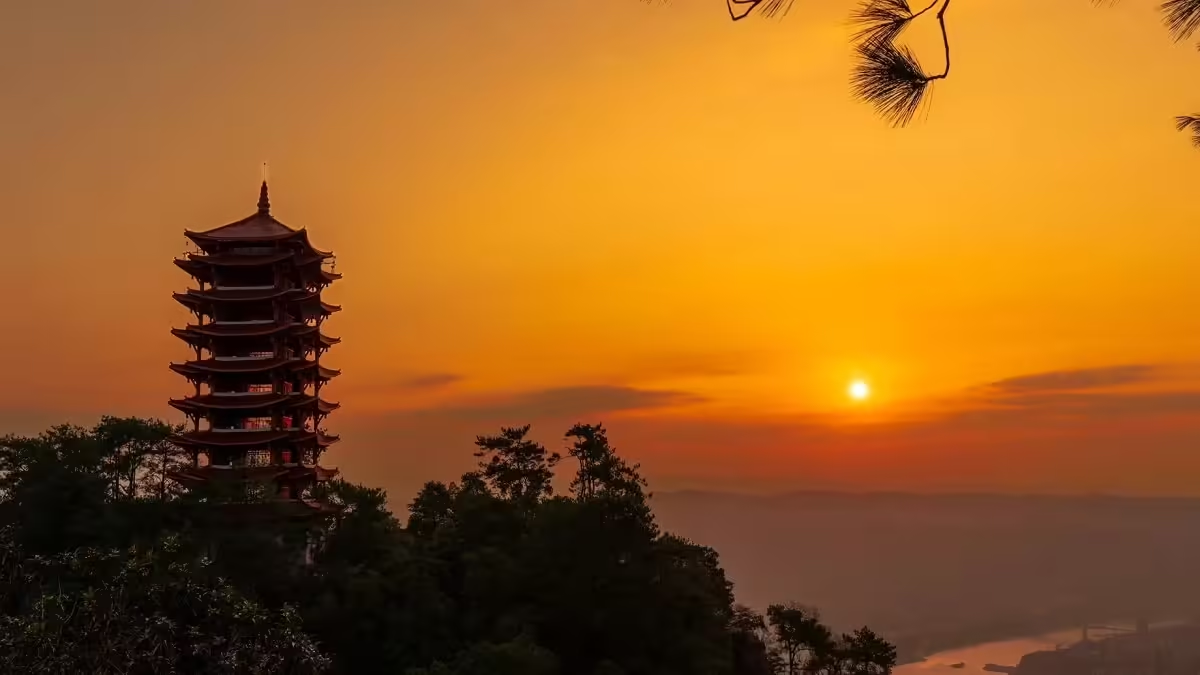Jinyun Mountain (缙云山) stands majestically on the banks of the Jialing River in the Beidi District of Chongqing. Formed during the “Yanshan Movement” around 70 million years ago, this “anticline” mountain range was historically known as Bashan. The mountain is renowned for its stunning sunrises and sunsets, with vibrant hues of purple, red, and a kaleidoscope of colors. The ancient Chinese observed the mesmerizing clouds and mist, leading to the poetic name “Jinyun,” which translates to “more red than white.”
The mountain range comprises nine prominent peaks, including the Morning Sun Peak, Incense Burner Peak, and Lion Peak, with Yujian Peak being the highest at an elevation of 1,050 meters.
In addition to its breathtaking natural landscapes such as Qingsi Rock, Dahu Lake, and the Bamboo Sea, Jinyun Mountain is home to numerous historical sites, including the Jinyun Temple and Shaolong View, along with notable cultural relics such as the Late Tang Dynasty stone screen wall, Song Dynasty stone carvings, and Ming Dynasty stone archways. This blend of natural beauty and rich history makes Jinyun Mountain a must-visit destination for nature lovers and history enthusiasts alike.
Travel Information about Jinyun Mountain
Ticket and Opening Hours
Admission Fee: 12 CNY. Free entry on March 12th (Tree Planting Day).
Cable Car:
- Upward: 30 CNY
- Downward: 20 CNY
- Round trip: 40 CNY
Opening Hours: 9:00 AM – 5:00 PM
Best Time to Visit
The best times to visit Jinyun Mountain are during the summer and autumn months, when the weather is relatively cool due to the mountain’s elevation. The winter and spring seasons tend to be colder, often with snow.
Getting to the Scenic Area
Location: 56 Jinhua West Second Branch Road, Beidi District, Chongqing.
Transportation: Take Metro Line 6 to Beidi Station. After arriving, transfer to the tourist shuttle bus to Jinyun Mountain from the station located next to the underground shopping mall. Return trips can be taken from the entrance of Jinyun Mountain.
Attraction Rating
- Beauty: ★★★★★
- Leisure: ★★★★
- Cultural Significance: ★★★★
- Uniqueness: ★★★
- Romance: ★★
- Adventure: ★
Highlights of Jinyun Mountain
Jinyun Temple
Jinyun Temple (缙云寺) is a Buddhist sacred site with a history of nearly 1,600 years, originally established during the Song Dynasty of the Southern Dynasties in 423 AD. It has been known by various names over the centuries, including “Xiangsi Temple,” “Chongsheng Temple,” and “Chongjiao Temple,” and has received royal patronage from successive emperors.
The temple has a rich educational heritage and was historically home to the Jinyun Academy, where religious and philosophical teachings were imparted. Among its treasures, the temple houses 24 volumes of Buddhist scriptures that were read by Emperor Taizong of the Song Dynasty.
Outside the temple, visitors can find the “Zhu Hu Long (Pig Transforms into Dragon)” relief sculpture on the stone screen wall, a significant relic from the Six Dynasties period. Additionally, there are stone-carved remnants of a half-body image of a Heavenly King, believed to be works from either the Liang or Northern Zhou Dynasty.
Lion Peak
Lion Peak (狮子峰), standing at an elevation of 864 meters, is the most rugged and spectacular of the Nine Peaks of Jinyun Mountain. Its name comes from its striking resemblance to a majestic lion’s head when viewed from a distance; when looking up from below, it appears as if a mighty lion is resting atop the mountain range.
At the summit of Lion Peak, visitors can explore the remains of an ancient stockade and various attractions, including the Upper Peak. Upon passing through a narrow gate, one can find the “Inscription for Repairing the Stockade,” erected in 1861 during the reign of Emperor Xianfeng.
The summit features bare, jutting rocks that create a dramatic landscape. Notably, there are two footprints on the peak, which, according to legend, were left by the True Warrior Ancestor after leaping from this peak to Zhenwu Mountain on the southern bank of the Yangtze River in Chongqing. Atop Lion Peak lies a square stone platform known as Tai Xu Tai (Great Void Platform), which is embedded with a stone tablet inscribed with the “Record of Tai Xu Tai.”
Xiangsi Rock
Xiangsi Rock (相思岩) is located to the northeast of Jinyun Temple, stretching over a hundred meters along a steep mountain face. The rock formation is notable for its sheer, smooth cliffs, which present an imposing and magnificent sight. The area beneath the rock is thick with ancient trees, creating a dense and serene forest.
At the base of the cliff, visitors can find numerous Song Dynasty inscriptions carved into the rock, resembling a wall. There are also caves hewn from the rock, traditionally believed to be a burial site for the ashes of ordinary people. Prominently displayed at the cliff’s base are the large characters spelling out “Xiangsi Cliff.”
At the peak of Xiangsi Rock, a massive stone can be seen. When viewed from a distance, it appears to resemble a person deep in thought, which is said to be the origin of the name “Xiangsi,” meaning “lovers” or “longing for each other.”
Dai Lake
Dai Lake (黛湖) is nestled in a serene valley between Jinyun Mountain and Beiwenshuan, surrounded by towering mountains and dense forests that provide ample shade. To the front lies the ancient Shaolong Temple, while to the right is the historic Jiulong Ancient Village. Although Dai Lake is not far into the mountains, it boasts towering ancient trees and lush foliage, with vibrant red rhododendron flowers dotting the landscape, creating a beautiful contrast against the verdant greenery.
The lake’s surface is as smooth as a mirror, reflecting the surrounding mountains and the blue sky above. Beneath the water, a rich variety of green algae can be found. According to records, the lake is home to a diverse array of charophyte plants, with over 140 species from 20 genera identified, representing approximately 70% of the documented charophytes in China. This abundance has earned Dai Lake the title of “a treasure trove of aquatic plants,” making it a remarkable destination for nature lovers and those interested in ecological diversity.
Baiyun Bamboo Sea
Baiyun Bamboo Sea (白云竹海) is located on the hillside of Jinyun Mountain, in Baiyun Village, and is backed by Xizhao Peak. The area derives its name from the ancient Baiyun Temple situated here, as well as from the expansive bamboo sea within the Jinyun Mountain Nature Reserve, which is also referred to as Jinyun Bamboo Sea. This region is the most concentrated area for bamboo growth in Jinyun Mountain, boasting over 20 varieties, including Moso bamboo, zhu bamboo, flat bamboo, bitter bamboo, golden bamboo, water bamboo, mountain bamboo, Luohan bamboo, Buddha bamboo, and phoenix tail bamboo.
The scenic area features numerous attractions, such as Baiyun Temple, a millennium-old ancient pine tree, the ancient Jinyun Path, golden hair bamboo, the high cliffs with Avalokitesvara statues, stone pillars, ox-heart stones, fish stones, the Ten-Thousand-Person Pit, and the bamboo sea stone boat. Below the lush bamboo forest flows the winding Jialing River, and the picturesque small town is clearly visible, creating a serene and tranquil atmosphere that refreshes the mind and spirit.
Visitor Guide for Jinyun Mountain
Transportation within Jinyun Mountain
The Jinyun Mountain cable car is one of the longest tourist cable cars in the country, stretching a total length of 1,974 meters, with a vertical height difference of 450 meters between the upper and lower stations. The one-way ride takes approximately 32 minutes, and the cable car operates daily from 9:00 AM to 5:00 PM.
The ticket prices for the cable car are as follows: 30 yuan for the ascent, 20 yuan for the descent, and 40 yuan for a round trip. To accommodate night visits for citizens, additional trips can be arranged if there are four or more people in a group, with ticket prices remaining the same as during the daytime.
Local Cuisine Near Jinyun Mountain
Near Jinyun Mountain, there are numerous farmhouse restaurants that allow visitors to enjoy authentic rural dishes while taking in the beautiful scenery.
Jinyun Mountain Restaurant 缙云山餐厅() is located just above the Jinyun Temple and specializes in homestyle mountain cuisine. While the dining environment is modest, the food is delicious. One recommended dish is the local chicken casserole, made with locally sourced free-range chickens. The generous portion and flavorful chicken broth make it a perfect meal after a day of hiking. Additionally, the fried pig’s head meat and wild bracken are also worth trying.
Leiyu Farmhouse (雷雨农家乐) is one of the earliest farmhouse restaurants in the area, situated within the Jinyun Mountain Forest Park, right next to Lion Peak. It’s a convenient spot for friends to gather and watch the sunrise or sunset. This restaurant raises its own free-range chickens, pond fish, and organic vegetables, making it an excellent choice for those wanting to taste fresh and local ingredients.
Accommodation Options Near Jinyun Mountain
Jinyun Mountain offers convenient accommodation options for visitors. The Tianxiangyuan Resort Hotel within the area has a pleasant environment. Additionally, there are many farmhouse accommodations outside the scenic area, typically priced between 80 to 120 yuan per person per night, which includes meals. This option is quite economical, although the conditions at these farmhouses may be basic, so it’s advisable to check the surroundings before making a decision.
Chongqing Tianxiangyuan Resort Hotel (重庆天香苑度假酒店) is located halfway up Jinyun Mountain, offering stunning views of the Jialing River. It is close to attractions such as Beiquan, Shaolong Temple, Jindao Gorge, and Jingangbei Ancient Town. The hotel features independent garden villas, providing a luxurious, natural, private, and cozy atmosphere. Address: No. 118, Songshu Fort Group, Beiquan Village, Chengjiang Town.
Other nearby accommodations include BaiLian Hotel (柏联酒店), Haiyu Hot Spring Hotel (海宇温泉大酒店), Kangle Hot Spring Resort (康乐温泉度假村), and Chongqing Xinjing Leyang Hotel (重庆心景乐养酒店), offering a variety of choices for travelers.
Activities at Jinyun Mountain
Jinyun Mountain Climbing Festival (缙云登山节): Held annually in spring, this festival features specially constructed climbing stairs with a user-friendly design, including rest platforms at every level. During the event, thousands of visitors flock to the mountain, some engaging in fitness hiking while others enjoy leisurely strolls, making it a joyful experience for people of all ages.
“Jinyun Sword Discussion” Martial Arts Tournament (“缙云论剑”武林大会): This event attracts representatives from eight major martial arts schools, including Wudang, Emei, Xingyi, and Bagua. Participants gather on the mountain to exchange martial arts techniques and skills. The “Jinyun Sword Discussion” has been held for several consecutive years, growing in excitement and popularity, drawing an increasing number of martial arts enthusiasts eager to learn and share their expertise.
Shopping at Jinyun Mountain
Ferns: Jinyun Mountain is home to 148 species of ferns, most of which have edible young shoots. These ferns are a popular local delicacy.
Guan Yin: Known as “Jingang Vine” locally and “Dutai” in western Sichuan, this plant’s tender shoots are harvested in the spring and summer for culinary use.
Jiaogulan: Often referred to as “Southern Ginseng,” Jiaogulan is primarily made into tea or used to extract beneficial components for health products.
Jinyun Sweet Tea: This tea is crafted from tender leaves and shoots harvested in spring and summer. After being steamed, rolled, and dried, it offers a sweet, fragrant flavor without any irritation. Regular consumption of this tea can aid in treating stomach issues and is an ideal sweet beverage for individuals with diabetes.

